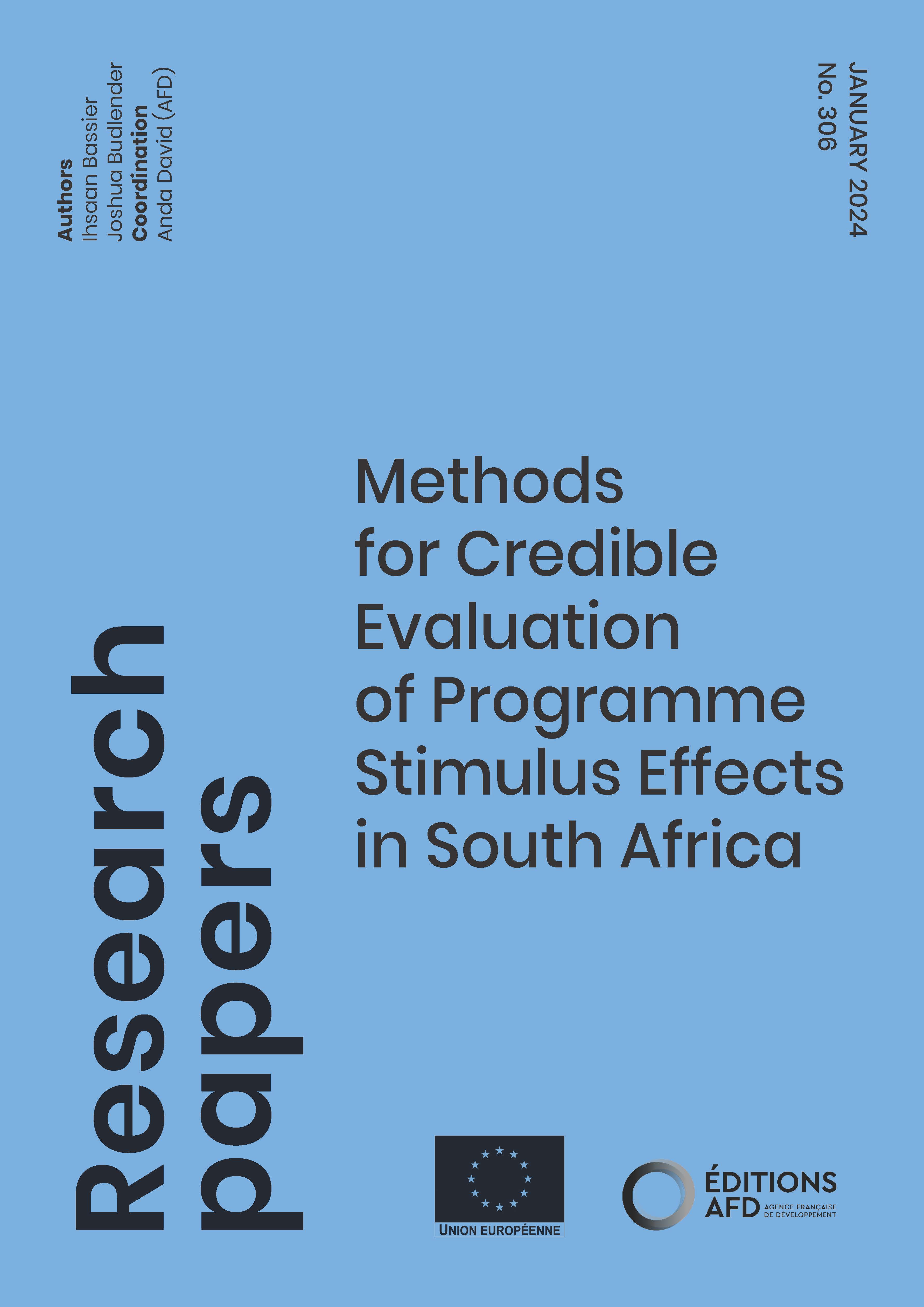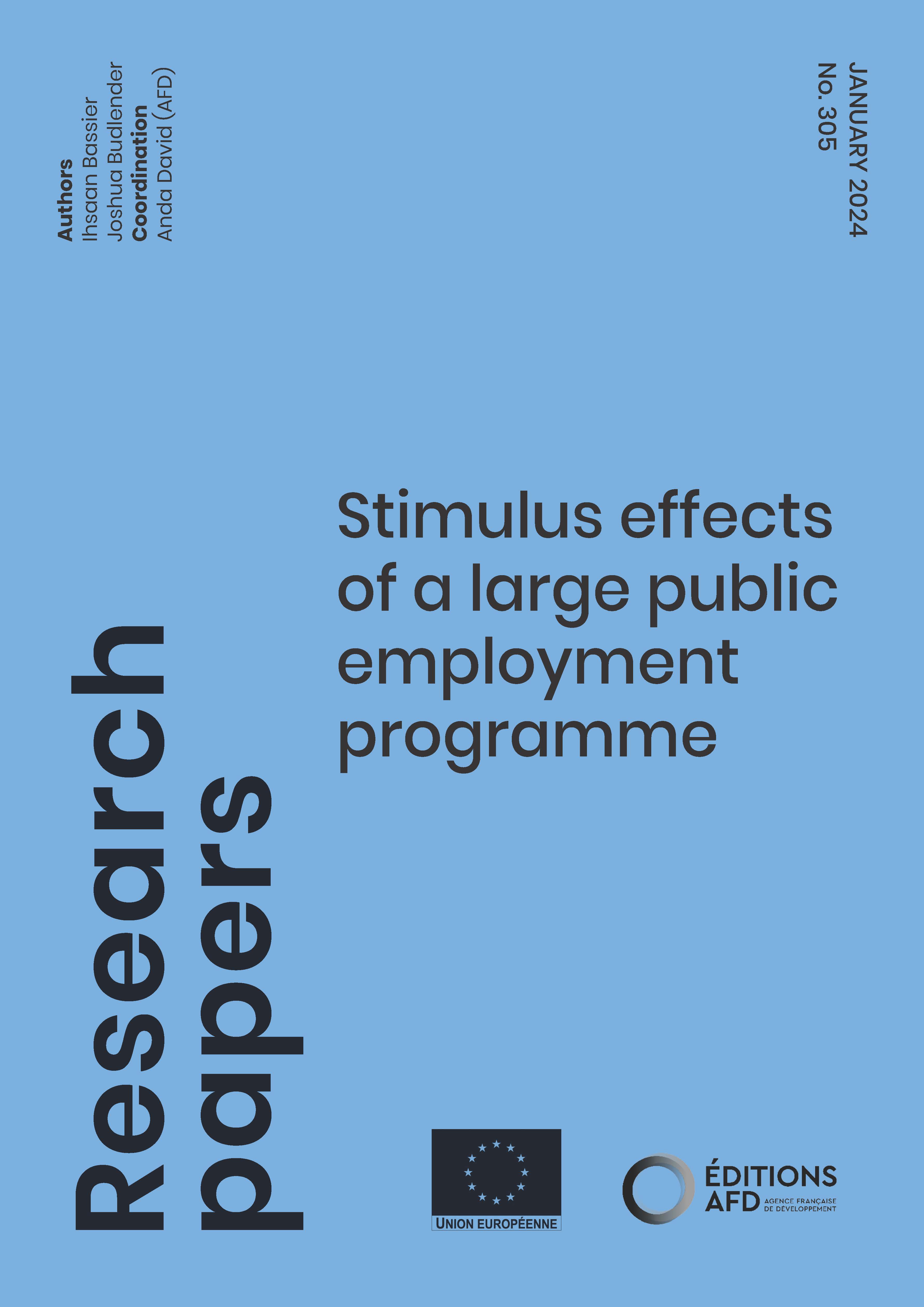 Legal notice EU (project) What have been the local stimulus effects of the South African Presidential Employment Stimulus Initiative (PES) and the national social grants program? The Extension of the EU-AFD Research Facility on Inequalities in partnership with SALDRU will seek to answer this question.
Legal notice EU (project) What have been the local stimulus effects of the South African Presidential Employment Stimulus Initiative (PES) and the national social grants program? The Extension of the EU-AFD Research Facility on Inequalities in partnership with SALDRU will seek to answer this question.
Context
The Covid-19 pandemic has forced societies around the world to make difficult trade-offs, as they try respond to the public health crisis on one hand, and to the economic and social distress arising out of it on the other. In South Africa, these combined crises have exacerbated already high levels of unemployment, deepening poverty and heightening levels of hunger and food insecurity.
To mitigate the combined health, social and economic crises stemming from the Covid pandemic, South African President Cyril Ramaphosa announced, in April 2020, a range of support measures to mitigate their impact, including emergency social protection and employment stimulus measures.
This project is part of the Extension of the EU-AFD Research Facility on Inequalities. Coordinated by AFD and financed by the European Commission, the Extension of the Facility will contribute to the development of public policies aimed at reducing inequalities in four countries: South Africa, Mexico, Colombia and Indonesia over the period 2021-2025.
Objectives
This research project aims to study the local stimulus effects of South Africa's PES and national social grants program. In order to do so, it brings together a wide range of existing and new data sources, such as shopper data provided by Shoprite Checkers and programme participant data from Harambee Youth Employment Accelerator, which are securely merged while preserving individual anonymity using local tech company Omnisient’s proprietary encryption technology.
The primary research focus will be on the multiplier effects of these two programs, that is, the effects of the programs on the economy beyond the direct impact of spending on program participants and their households.
These program-specific multiplier effects are crucial to the overall evaluation of the programs, particularly in the context of budget constraints, but are difficult to identify in a credible empirical manner given the lack of work on them in South Africa.
In studying them, this project thus has the dual objective of characterizing the spending patterns of stimulus beneficiaries and then examining how such spending is likely to stimulate economic activity in industries further up the product supply chain. Much of the analysis proposed is descriptive and extrapolative rather than causal when it comes to quantifying multiplier effects.
Thus, the overall goal of this research is to provide an incomplete but conservative and credible quantitative baseline for thinking about program-specific multipliers in South Africa, in an environment where such evidence is lacking.
Results
The publications and webinars related to this research project are available below.
You will find below the two research papers related to this project:
The project also organized two research conferences to present the results of the research. The replays are available below.
- SALDRU-AFD-EU Event: The stimulus effects of South Africa’s Basic Education Employment Initiative (February 7, 2024)
AFD, the EU Delegation in South Africa and SALDRU hosted a public event on the stimulus effects of the Presidential Youth Employment Initiative – Basic Education Employment Initiative (PYEI-BEEI) at the University of Cape Town.
The PYEI-BEEI programme, which targets 18-35 year-olds eligible as education assistants or general school assistants, is the largest component of South Africa’s Presidential Employment Stimulus (PES), announced in 2020 as one of the support measures against the impact of the COVID-19 pandemic.
The research was presented by Joshua Budlender (one of the project's researchers) and complemented by a presentation on the direct returns to learners in the classroom from the PES interns in the schools. Also under consideration is, as the PYEI-BEEI researchers conclude, whether other public spending (such as social grants) may have similar initial stimulus effects.
An interview with Josh Budlender is also available below:
- Research Conversations: Stimulus effects of public employment programmes (12 June 2024)
A webinar on the stimulus effects of public employment programmes with Anda David (AFD), Ihsaan Bassier (UCT-SALDRU) and Maikel Lieuw-Kie-Song (ILO) was also held.
Contact
- Anda David, AFD Research Officer
Download the research papers
 Does the use of stimulus programs and social grants by beneficiaries have an impact on the South African economy? Conducted by Infusion Knowledge as part of the Extension of the EU-AFD Research Facility on Inequalities, this research project examined the purchasing habits of stimulus beneficiaries and analyzed how the new "post-stimulus" environment impacts the trade and decision-making of commercial entities and some of their customers.
Does the use of stimulus programs and social grants by beneficiaries have an impact on the South African economy? Conducted by Infusion Knowledge as part of the Extension of the EU-AFD Research Facility on Inequalities, this research project examined the purchasing habits of stimulus beneficiaries and analyzed how the new "post-stimulus" environment impacts the trade and decision-making of commercial entities and some of their customers.
Contexte
This paper aimed to contribute to the body of knowledge on the impact of social protection and employment stimulus measures on the formal and informal economies.
In July 2019, Infusion Knowledge Hub conducted a study on opportunities for wholesale in Stock Road in Philippi in the Western Cape Province on behalf of a large South African supermarket chain. The purpose of the study was to understand the trading environment in the informal and small business market to elicit a value-added cash and carry shopping proposition (Vawda, Prinsloo and Prinsloo, 2019).
In June 2022, as part of a research program launched by the Presidency of South Africa and Agence Française de Développement, funded by the European Union, Infusion Knowledge Hub replicated the study to determine whether there are shifts in purchasing behaviour amongst the informal and small traders that participated in the 2019 research. In doing so, the study aimed to provide granular data on shifts in the informal and small traders’ operating environment around Stock Road in Philippi between July 2019 and June 2022. In addition, the research investigated the spending patterns of 30 Social Relief Distress (SRD) grant recipients and 31 Basic Education Employment Initiative (BEEI) participants.
This project is part of the Extension of the EU-AFD Research Facility on Inequalities (RFI). Coordinated by AFD and financed by the European Commission, the Extension of the RFI will contribute to the development of public policies aimed at reducing inequalities in four countries: South Africa, Mexico, Colombia and Indonesia over the period 2021-2025.
Objectif
Two studies analysing the local effects of the South African Presidential Employment Stimulus Initiative (PES) and the national social grants programme were produced:
- One study, presented in note form, that builds on Infusion's long-standing relationship with Shoprite to allow SALDRU to use Shoprite's customer data to explore the shopping habits of stimulus beneficiaries. The focus was on unpacking purchasing data related to beneficiaries who receive the Distressed Social Relief Grant and those who are part of the school assistants programme managed by the Department of Basic Education (DBE).
- A research paper that details through descriptive and inferential statistical analysis the transfer to a mobile application, called NECTA, of a landmark study by Infusion and Shoprite conducted among informal vendors and "Spaza" stores in Philippi. This data provides an overview of what has been happening in these businesses since July 2019 (the date of the initial project), as well as an opportunity to see how the new "post-stimulus" environment is impacting the trade and decision-making of these business entities as well as some of their customers.
Résultats
You will find below the research paper related to this project :
Measuring stimulus effects around Stock Road in Philippi on the Western Cape.
Contact:
- Anda David, AFD Research Officer
 What have been the impacts of the Covid-19 national stimulus package's social assistance on local economies and informal sector workers in South Africa? The Extension of the EU-AFD Research Facility on Inequalities program sought to answer this in collaboration with CSDA.
What have been the impacts of the Covid-19 national stimulus package's social assistance on local economies and informal sector workers in South Africa? The Extension of the EU-AFD Research Facility on Inequalities program sought to answer this in collaboration with CSDA.
Contexte
In South Africa, informal work is a feature of the labor market - one in six South African workers is employed in the informal sector. During the pandemic, millions of workers without legal or social protection were disproportionately affected by the negative impacts of measures to prevent the spread of COVID-19 (loss of jobs, hours of work and income...). As a "forgotten" sector in many ways, it should not be forgotten that the informal sector provides livelihoods, employment, and income for millions of workers and business owners, and contributes significantly to the country's Gross Domestic Product (GDP).
In response to the social and economic effects of the pandemic on vulnerable groups, the South African government has further developed its social protection system. As part of the social assistance component of the COVID-19 stimulus package, it introduced a new Social Relief of Distress (SRD) grant in April 2020. This social assistance grant is for the first time targeted at many informal workers on the basis of their employment status.
While the positive links between the subsidy and economic activity had already been studied, as well as the limits to this interaction, it remained to be understood whether and how the SRD had been used by informal workers and what economic effects had been generated. This project was conducted by CSDA as part of a larger program to analyze various components of the South African government's Covid and recovery stimulus package.
This project is part of the Extension of the EU-AFD Research Facility on Inequalities (RFI). Coordinated by AFD and financed by the European Commission, the Extension of the RFI will contribute to the development of public policies aimed at reducing inequalities in four countries: South Africa, Mexico, Colombia and Indonesia over the period 2021-2025.
Objectif
To better understand the effects of the Covid and recovery public policy stimulus on reducing inequality, this study qualitatively analyzed the interactions and impacts of the SRD (as well as other subsidies, and the stimulus package more broadly) on local economies.
In particular, it focused on the experiences of women and men traders in the informal sector, who represent a significant proportion of informal sector workers. Through the data collected, differentiated patterns by gender, location, and level of the informal worker in his or her work organization have also been revealed.
Résultats
You will find below the research paper related to this project :
The local economic development effects of income transfers. The Social Relief of Distress grant.
Contact:
- Anda David, AFD Research Officer


